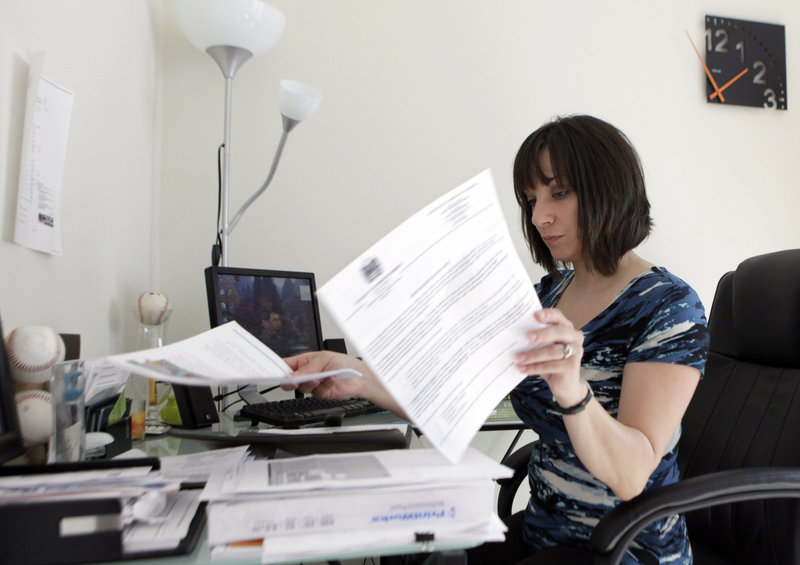SAN FRANCISCO – A clerical error landed Kathleen Casey on the streets.
Out of work two years, her unemployment benefits exhausted, in danger of losing her apartment, Casey applied for a job in the pharmacy of a Boston drugstore. She was offered $11 an hour. All she had to do was pass a background check.
It turned up a 14-count criminal indictment. Kathleen Casey had been charged with larceny in a scam against an elderly man and woman that involved forged checks and fake credit cards.
There was one technicality: The company that ran the background check, First Advantage, had the wrong woman. The rap sheet belonged to Kathleen A. Casey, who lived in another town nearby and was 18 years younger.
Kathleen Ann Casey, would-be pharmacy technician, was clean.
“It knocked my legs out from under me,” she says.
The business of background checks is booming. Employers spend at least $2 billion a year to look into the pasts of their prospective employees.
But it is a system weakened by the conversion to digital files and compromised by the welter of private companies that profit by amassing public records and selling them to employers. These flaws have devastating consequences.
It is a system in which the most sensitive information from people’s pasts is bought and sold as a commodity. A system in which computers scrape the public files of court systems around the country to retrieve personal data. But a system in which what they retrieve isn’t checked for errors that would be obvious to human eyes.
A system that can damage reputations and, in a time of precious few job opportunities, rob honest workers of a chance at a new start. And a system that can leave the Kathleen Caseys of the world — the innocent ones — living in a car.
Two decades ago, if a county wanted to update someone’s criminal record, a clerk had to put a piece of paper in a file. And if you wanted to read about someone’s criminal past, you had to walk into a courthouse and thumb through it. Today, half the courts in the United States put criminal records on their public websites.
Digitization was supposed to make criminal records easier to access and easier to update. To protect privacy, laws were passed requiring courts to redact some information, such as birth dates and Social Security numbers, before they put records online. But digitization perpetuates errors.
“There’s very little human judg- ment,” says Sharon Dietrich, an attorney with Community Legal Services in Philadelphia, a law firm focused on poorer clients. Dietrich represents victims of inaccurate background checks. “They don’t seem to have much incentive to get it right.”
Dietrich says her firm fields about twice as many complaints about inaccurate background checks as it did five years ago.
The mix-ups can start with a mistake entered into the logs of a law enforcement agency or a court file. The biggest culprits, though, are companies that compile databases using public information.
In some instances, their automated formulas misinterpret the information provided them. Other times, as Casey discovered, records wind up assigned to the wrong person with a common name.
Another common problem: When a government agency erases a criminal conviction after a designated period of good behavior, many of the commercial databases don’t perform the updates required to purge offenses that have been wiped from the public record.
It hasn’t helped that dozens of databases are now run by mom-and-pop businesses with limited resources to monitor the accuracy of the records.
The industry of providing background checks has been growing to meet the rising demand for the service. In the 1990s, about half of employers said they checked backgrounds. In the decade since Sept. 11, that figure has grown to more than 90 percent, according to the Society for Human Resource Management.
To take advantage of the growing number of businesses willing to pay for background checks, hundreds of companies have dispatched computer programs to scour the Internet for free court data.
But those data do not always tell the full story.
Gina Marie Haynes had just moved from Philadelphia to Texas with her boyfriend in August 2010 and lined up a job managing apartments. A background check found fraud charges, and Haynes lost the offer.
A year earlier, she had bought a used Saab, and the day she drove it off the lot, smoke started pouring from the hood. The dealer charged $291.48 for repairs. When Haynes refused to pay, the dealer filed fraud charges.
Haynes relented and paid after six months. Anyone looking at Haynes’ physical file at the courthouse in Montgomery County, Pa., would have seen that the fraud charge had been removed. But it was still listed in the limited information on the court’s website.
The website has since been updated, but Haynes, 40, has no idea how many companies downloaded the outdated data. She has spent hours calling background check companies to see whether she is in their databases. Getting the information removed and corrected from so many different databases can be a daunting mission. Even if it’s right in one place, it can be wrong in another database unknown to an individual until a prospective employer requests information from it. By then, the damage is done.
“I want my life back,” Haynes says.
Haynes has since found work as a customer service manager, but she says that is only because her latest employer didn’t run a background check.
Hard data on errors in background checks are not public. Most leading background check companies contacted by the AP would not disclose how many of their records need to be corrected each year.
A recent class-action settlement with one major database company, HireRight Solutions Inc., provides a glimpse at the magnitude of the problems.
The settlement, which received tentative approval from a federal judge in Virginia last month, requires HireRight to pay $28.4 million to settle allegations that it didn’t properly notify people about background checks and didn’t properly respond to complaints about inaccurate files. After covering attorney fees of up to $9.4 million, the fund will be dispersed among nearly 700,000 people for alleged violations from 2004 to 2010. Individual payments will range from $15 to $20,000.
In an effort to prevent bad information from being spread, some courts are trying to block the computer programs that background check companies deploy to scrape data off court websites. The programs not only can misrepresent the official court record but can also hog network resources, bringing websites to a halt.
Some states, exasperated by mounting errors in the data, have stopped offering wholesale subscriptions to their records.
Kathleen Casey scraped by on temporary work until she settled her lawsuit against First Advantage. It corrected her record. But the bad information has come up in background checks done by other companies.
She has found work, but she says the experience has left her scarred. “This could rear its ugly head again — and what am I going to do then?”
Send questions/comments to the editors.




Comments are no longer available on this story